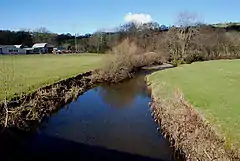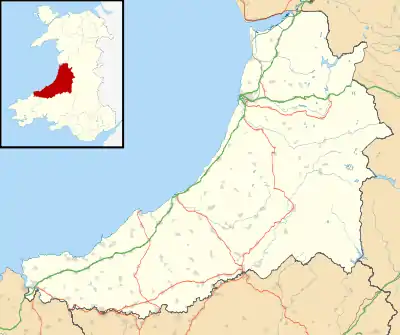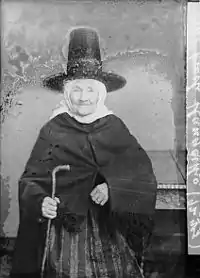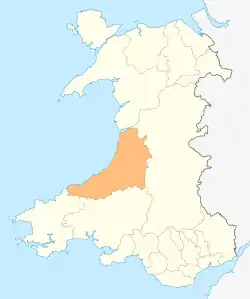Llangeitho
Llangeitho is a village and community in Ceredigion, Wales, on the upper River Aeron, about 6 kilometres (4 mi) west of Tregaron and 11 kilometres (7 mi) north of Lampeter. The population was 874 in 2001,[2] but fell to 819 at the 2011 census.
| Llangeitho | |
|---|---|
 Afon Aeron at Llangeitho | |
 Llangeitho Location within Ceredigion | |
| Population | 819 [1] |
| OS grid reference | SN679597 |
| Community |
|
| Principal area | |
| Ceremonial county | |
| Country | Wales |
| Sovereign state | United Kingdom |
| Post town | Tregaron |
| Postcode district | SY25 |
| Dialling code | 01974 |
| Police | Dyfed-Powys |
| Fire | Mid and West Wales |
| Ambulance | Welsh |
| UK Parliament | |
| Senedd Cymru – Welsh Parliament | |
Nonconformism
The village is associated with Daniel Rowland (born here in 1713) and the Welsh Methodist revival in the 18th century. Rowland served as curate at Nantcwnlle and Llangeitho. The village chapel, built in 1760, became famous throughout Wales as a Calvinistic Methodist centre and thousands visited it to hear the preaching. Rowland was buried in the village and there is a memorial column to him. Two larger, replacement chapels were built in 1764 and 1814.
Llangeitho saw several further periods of religious revival in that century. The strongest was in 1762, when rejoicing, dancing and jumping for joy earned the Welsh Methodists the nickname "Jumpers". William Williams Pantycelyn wrote in defence of the celebrations.[3] The village was also the childhood home of David Martyn Lloyd-Jones.[4]

Language
Like much of Ceredigion, Llangeitho was a stronghold of the Welsh language, but in the 1970s, newcomers to the village contributed to a decline in the proportion of habitual Welsh speakers from 83 per cent in 1971 to 55 per cent ten years later. The second figure recurred in 2011.[5]
The 17th-century poet and minstrel Dafydd Llwyd Mathau is thought to have come from the Llangeitho area.[6]
About 2.4 kilometres (1.5 mi) north of the village is the mansion of Cwrt Mawr, where the antiquary J. H. Davies (1871–1926) built up a valuable collection of Welsh-language manuscripts, known as the Cwrtmawr manuscripts. He donated them to the National Library of Wales, where they remain.
Church
The village church, across the river to the north of the village, is on an ancient site, but the current church was entirely rebuilt in 1821, retaining nothing of the medieval fabric, which included a double rood screen and three arches.[7]
The church and parish are named after St Ceitho. The water of St Ceitho's Spring is said to have the peculiarity that it is cool in summer and tepid in winter.[8]
School
The village primary school, Ysgol Gymunedol Llangeitho, closed in 2012 due to an amalgation.[9] The nearest school today is Ysgol Henry Richard, which teaches in both Welsh and English.
The earliest record of a school in the village mentions the foundation of a mixed, Calvinistic Methodist school there in 1821.[10]
Governance
Llangeitho gained a seat on Cardiganshire County Council in 1889. In November 2019, the member of what is now Ceredigion County Council to represent Llangeitho ward was David Rhodri Wyn Evans.[11] The ward extends to some neighbouring communities and holds a population of 1,459.[12]
References
- "Community population 2011". Retrieved 12 May 2015.
- Office for National Statistics: Census 2001: Parish Headcounts: Ceredigion Retrieved 19 January 2010
- Evans, Eifion (1985). Daniel Rowland. Banner of Truth. ISBN 9780851514468.
- Murray, Iain (1982). David Martyn Lloyd-Jones: The First Forty Years, 1899–1939 v. 1. Banner of Truth. ISBN 978-0851513539.
- "Welsh speakers by electoral division, 2011 Census". StatsWales. Welsh Government. Retrieved 12 November 2019.
- Williams, Griffith John. "Dafydd Llwyd Mathau". Dictionary of Welsh Biography. National Library of Wales. Retrieved 24 November 2016.
- National Monuments Record of Wales
- Baring-Gould, Sabine; Fisher, John (1908). The Lives of the British Saints: The Saints of Wales and Cornwall and Such Irish Saints as Have Dedications in Britain, Volume 2. C. J. Clark. p. 102.
- Ysgol Gymunedo Llangeitho. Retrieved 18 October 2020.
- Historical records. Retrieved 18 October 2020.
- County Council website
- "Ward population 2011". Retrieved 12 May 2015.
External links
 Media related to Llangeitho at Wikimedia Commons
Media related to Llangeitho at Wikimedia Commons- Llangeitho and Welsh revivals by D. Geraint Jones. At the Heath Christian Bookshop website
- Statistics about Llangeitho
- www.geograph.co.uk : photos of Llangeitho and surrounding area
- Map sources for Llangeitho

